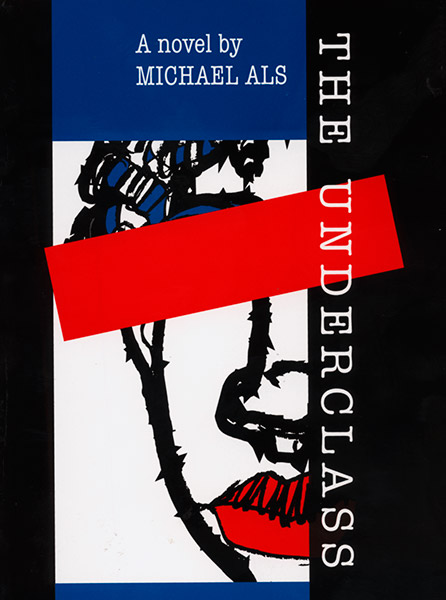“A Bombshell of a Novel” Mary Hanna reviews The Underclass for the Jamaica Gleaner (January 21, 2007) Book review by Mary Hanna.
A BOMBSHELL OF A NOVEL
The Underclass by Michael Als.
StarApple, 2006. 239 pages.
A thoughtful and stark telling of a story from Hell, Michael Als’s The Underclass reveals the harsh underbelly of the city of Port of Spain and its inhabitants through the experiences of Kissandra Bates. This young female protagonist is caught in the wheel of poverty in a city without mercy and with no home to go back to, as her stepfather’s drinking and rapacious behaviour makes her mother’s abode uninhabitable for her. Kissandra has fled to the city and there… she become one of the vulnerable young who are trying to make a living despite the agonizing contingencies this entails.
Michael Als is a social activist who has been involved in the struggle for social transformation for many years. Andrew Salkey has compared his story of underdevelopment to Orlando Patterson’s The Children of Sisyphus for sheer impact and sympathetic portrayal of the young and poor in a Caribbean setting. Salkey calls The Underclass ‘a bombshell of a novel’.
About Als’s previous novel, No Half a Loaf, Salkey says, ‘All his storylines and composite narratives are powerful and persuasive. His characterization and portraiture are splendidly memorable. And his prose diction, especially his capturing of the Trini demotic, is authentic and compelling, as the very breath and inflexion of his beloved people.’ This critique hold true for Als’s recent novel also.
The book is realistic in a pared down and gripping fashion, driven by a forthright narrative that tells the experience of Kissandra, and later of her friend Annie, with no pause for moralizing or explanation. Als does not explain too much to the reader, but rather presents his characters and their life experiences in a raw but calm style that makes them easily apprehensible and profoundly moving. These young people, and especially the courageous and right-thinking Kissandra, are caught in situations beyond their control in the family, in the workplace, in the hungry and dangerous city.
Kissandra leaves home to escape a drunken and incestuous step-father and finds herself used by an adulterous mistress to cover her own behaviour. Kissandra ends up arrested for the theft of a bracelet, a crime she did not commit. Out of a job, Kissandra manages to find temporary shelter with the Salvation Army but is soon out on her own again.
The numerous jobs and rapes of various kinds that she then endures are evoked with knowledge and without embellishment. Kissandra constantly compares the city and Gasparillo, her village in South Trinidad, and realizes that while there is more opportunity in Port of Spain, she has no way of going back even if she wanted to.
She is determined to make the best of it, and we follow her from episode to episode almost in picaresque style as she becomes hardened to the suffering of the city and its constant disappointments and shaming:
‘When she had first arrived in the city, events had moved swiftly. She had lost her first job, and then found herself in the Salvation Army’s night shelter for working girls. She had wanted to be free of the shelter. Her employment in a factory soon ended after her attempt to get a raise. She had gotten another job and left the shelter. She was raped. Things moved even more quickly. She left the motorcyclists’ group. The pace was too torrid, the demand on courage too great. She met a man who altered her life. Then she lost her job again, found another job and lost it once more.’
Michael Als knows the rhythm of poverty and entrapment. He writes with authority and simplicity to bring the reality of the underclass to light in a headlong tale of horror and brutality. The women in his narrative are heroes of survival as they are forced again and again to compromise themselves and their bodies and to survive despite the challenges that they face day by day.
Als’s talent for motivation is proven on every page. He says…
‘Grief had overcome her. She wondered why fate was so cruel, why life itself was so punitive; the thoughts flew in and out of her mind and she could get no rest. Dick Tracey seemed to have lost all his drive. They drifted apart and she herself could not find the energy to feed his broken spirit’.
Als shines in his ability to open reader awareness to the impact of members of the community on the protagonist, to show how her spirit and behaviour is interactive with those around her.
Ultimately, Kissandra finds an old carpenter who is able to help her anchor herself in a decent friendship and with whom she can drink a quiet cup of tea while listening to positive truths about life.
She knows that she is a survivor, and her friend agrees – indeed, he calls her a hero and says: ‘If I could give somebody a crown or a belt to wear as a champion fighter, I would give it to you’. The novel ends on this note, without rescue from life’s circumstances but with a heartfelt recognition of Kissandra’s life as it has been up to this point and to her powerful spirit that shines through in the midst of tears.
It would have been too simplistic to provide the protagonist with a way out of the jungle of her environment – a good husband, say, or a job with a future. Als writes from his own knowledge of the way things are in the inner city. He presents the reader with a blueprint to the minds and hearts of the young caught in the city’s maw – especially the young women.
His stories interweave and reflect each other. His women – mother, daughter, friend – are all caught up in circumstances that appear to be without exit. Als controls his narrative so that it flows evenly and is filled with a deep compassion for his characters.
It would be interesting to have as much insight into the male characters that haunt these pages, preying on the young women and causing them grievous bodily harm. But that is for another story. We look forward to Als’s next book, and wonder if he will pick up on the open end of Kissandra Bates’s life and tell us more of her struggle to survive.



